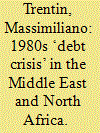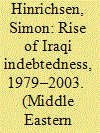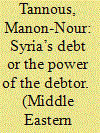|
|
|
Sort Order |
|
|
|
Items / Page
|
|
|
|
|
|
|
| Srl | Item |
| 1 |
ID:
186160


|
|
|
|
|
| Summary/Abstract |
The article reviews the positions and policies of Middle Eastern and North African states towards the external ‘debt crisis’ of the 1980s within the context of contemporary debates and negotiations held at regional and international levels. MENA countries shared many commonalities with their developing partners across the postcolonial world and participated actively in the debates within multilateral organizations, such as the United Nations Conference on Trade and Development (UNCTAD). Because standard borrowing in the MENA was public, bilateral and closely tied to politics, the article argues for the relevance of regional factors in shaping the course of the debt crisis in the MENA region, and challenges the common visions for which Western creditors could manage external debt as an effective ‘lever’ for introducing neoliberal policies: oil endowment, armed conflicts and alliances shaped the timing and results of the debt crisis in the MENA. The research is based on an extensive review of regional and international literature coupled with documents and proceedings from the UN organizations.
|
|
|
|
|
|
|
|
|
|
|
|
|
|
|
|
| 2 |
ID:
186164


|
|
|
|
|
| Summary/Abstract |
Algeria’s integration into the global neoliberal economy accelerated in the context of debt servicing problems. International Financial Institutions supported such integration through a reform agenda based on the ‘Washington Consensus’. This article highlights how Algeria’s military-bureaucratic elites influenced the process thanks to their understanding of the main principles that informed it. This underscores the problematic aspects affecting the intervention of the International Monetary Fund (IMF) and the World Bank. Thanks to the study of the IMF, World Bank and Algerian primary sources, this essay argues that Algeria managed to rebalance its position towards international creditors. The IMF and World Bank-sponsored programmes not only supported the regime during a civil conflict against jihadist insurgents. They also favoured the renewal of neopatrimonial mechanisms keeping Algeria’s military-bureaucratic elites in power. Exploring the management of financial assistance, is fundamental to understand how Algeria did not address historical socio-economic problems paving the way for renewed popular contestation and financial hardships.
|
|
|
|
|
|
|
|
|
|
|
|
|
|
|
|
| 3 |
ID:
186161


|
|
|
|
|
| Summary/Abstract |
This article deals with Egypt's debt crisis experience of the 1980s, which marked its own place in history. By the 1980s Egypt had a savings-investment gap; an export import gap; and a gap between government revenue and expenditure. The textbook answer was the Washington Consensus. Towards the end of the 1980s Egypt's military debt plus an interest rate of 15 per cent put the country in a situation where it wanted the debt to be cancelled. The USA responded that debt forgiveness wouldn’t be possible given the laws of the land. However, with Egypt’s participation in the liberation of Kuwait from the invasion of Iraq, the USA could cancel the debt. After that, Saudi Arabia and Kuwait cancelled Egypt's debts to them. Other countries in Europe agreed, provided that Egypt would reach agreement with the World Bank and International Monetary Fund. Consequently, Egypt’s interest rates turned from negative to positive. Inflation fell from 22 per cent to 4.1 per cent, and the budget deficit fell to 0.6 per cent. Active negotiations of the Egyptian Ambassador, Mr El Reedy, fully supported by President Mubarak were key to this solution. This reflects the importance of having a multidimensional discussion when discussing the economic aspect of debt.
|
|
|
|
|
|
|
|
|
|
|
|
|
|
|
|
| 4 |
ID:
186159


|
|
|
|
|
| Summary/Abstract |
Although the sovereign debt is primarily a long-term accounting occurrence that can emerge in the public budget, its management refers to the economic sphere as much as to the political one. Moreover, as its structure and size depend on the decisions made in both domains in a certain context, space, and time circumstances matter in debating the problem. Thus, the study of the nineteen eighties MENA economies ‘sovereign debt crises must consider also the contextual economic and political conditions and behaviours. Since these aspects represent usually subject matters for different disciplinary fields, it is difficult to take into consideration all of them without a multifaceted keynote. The concept of ‘economic policy paradigm’ can represent an analytical economic device that, alongside with the economic nature of the budget crisis, can also embed the players and the strategic interests acting in the negotiation process and in the application of the economic measures to cancel out the sovereign debt. The paper applies such analytical framework to show how, due to a change in the ‘economic policy paradigm for the development,’ the emergence of the public debt in nineteen seventies MENA economies became the ‘sovereign debt crises.
|
|
|
|
|
|
|
|
|
|
|
|
|
|
|
|
| 5 |
ID:
186162


|
|
|
|
|
| Summary/Abstract |
The fall of international oil prices by the mid-1980s and the associated economic downturn of the oil-rich countries of the Gulf represented a turning point in the economic history of Jordan, which has been historically dependent on international aid and workers’ remittances. Expansionary policies, failing to recognize the reduced inflow of external rent, led to an unprecedented rise in public debt. The situation culminated in 1989 in a deep financial crisis which induced Jordan to start a comprehensive economic reform program, inspired by the principles of the Washington Consensus. This study aims at investigating the emergence and main sources of Jordanian public debt, focusing on its external components. Based on archival research and interviews with experts, the study analyses the main reasons behind the rapid public debt increase in the second half of the 1980s and discusses its sustainability in relation to main creditor nations, negotiations with the donor community, conditionality of support, and implementation of reforms. The analysis reveals that before the 1989 crisis, there was no centralized management of public debt and debt was contracted to finance the needs of a bloated state apparatus and was not linked to comprehensive development strategies.
|
|
|
|
|
|
|
|
|
|
|
|
|
|
|
|
| 6 |
ID:
186158


|
|
|
|
|
| Summary/Abstract |
The year 2022 marks the fortieth anniversary of the 1982 Mexican debt crisis, the first of a long series of financial turbulences that would soon spread to most of the developing world and beyond. Ever since, international historiography has produced a wide arrange of analyses that, despite their diversity, came to see the 1980s international debt crisis as a momentous event through which the United States and Western Europe reimposed their financial hegemony over the decolonised world and socialist camp. The contributions to this special issue of Middle Eastern Studies primarily aim at reassessing the process that brought economic neoliberalism throughout the Middle East and North Africa (MENA) in the context of debt crises. In particular, they challenge ‘teleological’ views that see the opening to market economy as a result of the creditors’ agenda, thus depriving actors in debtor countries of their agency. The essays published herein explore the levers, instruments and policy-making process to which debtor states resorted to shape their own integration process in the global neoliberal economy.
|
|
|
|
|
|
|
|
|
|
|
|
|
|
|
|
| 7 |
ID:
186163


|
|
|
|
|
| Summary/Abstract |
In 1979 Iraq was a net creditor to the world. Fifteen years later, its government debt-to-GDP was over 1,000 per cent. At the time of the US invasion in 2003, Iraq was saddled with around 130 billion US dollars in external debt. How does a country incur so much debt, so fast? In answering this question, the article reconstructs the build-up of Iraqi debt through the 1980s and 1990s. This article is the first to create a debt series going back to 1979. The rise in Iraqi indebtedness was a consequence of global geopolitical trends in the 1980s where political lending trumped solvency concerns. It allowed Iraq to obtain financing on terms more favourable than the US government, without conditionality of reform.
|
|
|
|
|
|
|
|
|
|
|
|
|
|
|
|
| 8 |
ID:
186165


|
|
|
|
|
| Summary/Abstract |
If public debt appears as a means for global powers to put pressure on the Arab countries, the case of Syria in the 1980s seems to be different. Syria’s geopolitical positioning under Hafez al-Assad – asserting himself as a key partner – proved to be a lever during the negotiations on debt. This article shows that, despite asymmetrical relations, the debtor – Syria – resisted negotiating external debt under the terms set by the foreign creditors, i.e. international financial institutions (World Bank and IMF), Western countries and the Soviet ally. To illustrate this, we will take the example of the French-Syrian relation with regard to debt. As it was closely connected to foreign policy, debt was shifting from a technical problem to a political one, this gradual shift being favourable to the Syrian position. This study could thus help to identify each phase of this asymmetrical negotiation until an agreement was reached in 1996.
|
|
|
|
|
|
|
|
|
|
|
|
|
|
|
|
|
|
|
|
|